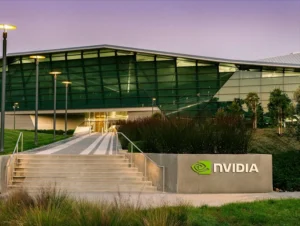
Nvidia is on the verge of surpassing Apple to become the globe’s second-largest company by market value, bolstered by its expanding semiconductor portfolio and intensifying competition in the chip industry.
Nvidia is advancing rapidly with its premium chips and is poised to maintain its significant progress in innovation.
The firm, best known for its semiconductor products, is on track to overtake Apple, the creator of the iPhone, as the world’s second-highest valued company. The value of Nvidia’s stock has almost tripled in the last year, reaching US$2.68 trillion, marking it as the first semiconductor company to hit a trillion-dollar market valuation.
In contrast, Apple has faced challenges in recent times in attracting consumer interest. The demand for iPhones has waned, and with the rise of competitors from China, its valuation was last reported at US$2.92 trillion by Reuters.
As Apple delves deeper into its generative artificial intelligence (Gen AI) initiatives, it contributes to the ongoing intense rivalry within the international tech arena.
Artificial intelligence continues to be a key focus for major technology companies.
AI applications are increasingly capturing the attention of the business world and have become a prominent topic among the public. Notably, platforms such as ChatGPT have broken new ground by becoming the consumer application to reach over 100 million users in the shortest span of time.
In this landscape, Nvidia’s critical contribution to the development of graphics processing units (GPUs) for both gaming and business software is widely acknowledged. Amidst a worldwide scarcity of chips, numerous leading technology firms are vying for Nvidia’s advanced GPU technology to improve their AI offerings.
The importance of GPUs in the advancement of AI is undeniable, as they are instrumental in decreasing the duration required to train AI models. This capability provides enterprises with advantages like instantaneous data processing and improved decision-making abilities.
Driven by demand, Nvidia has set a record as the quickest company to escalate its valuation from US$1 trillion to US$2 trillion in 2024, as reported by Reuters, surpassing other tech giants like Amazon and Alphabet, the parent company of Google.
The company has adeptly forecasted and met customer needs, aligning its breakthroughs with market demands. Presently, Nvidia’s AI technologies are integral to the operations of services provided by Alibaba, Amazon, Google, Meta, Microsoft, and more. Additionally, Nvidia has been proactive in enhancing business capabilities in AI, notably with the launch of a novel series of AI chips following the imposition of export limitations on the People’s Republic of China last year.
Jensen Huang, the CEO of the company, earlier commented on Nvidia’s ongoing transformation of the computing landscape: “Our robust expansion is indicative of the industry-wide shift from conventional computing to accelerated computing and Gen AI. Nvidia’s GPUs, CPUs, networking, AI foundry services, and Nvidia AI Enterprise software are propelling forward at full speed. We are now entering the age of generative AI.”
Competition with Apple
The rivalry among tech corporations, Apple included, is intensifying.
As 2024 began, this leading tech entity relinquished its top market position to Microsoft, which now claims the title of the world’s most valuable company. The firm is grappling with diminishing demand and is striving to shift its focus towards more ambitious AI strategies.
Earlier in 2024, it expanded its AI capabilities by acquiring the Canadian AI firm DarwinAI, aiming to advance AI technology across various sectors.
More recently, in June 2024, there have been reports of the company finalizing an agreement to integrate OpenAI’s Gen AI technology into Apple’s suite of software. Considering OpenAI’s pre-existing partnership with Microsoft, the dynamics of competition between these tech behemoths as they vie for market dominance will be intriguing to observe.
For Nvidia, the stakes in the competitive landscape are higher than ever, with a growing number of enterprises looking to enhance their cloud services and AI technology development.
Read more about technology trend here

